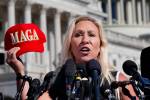House ethics panel says Berkley violated rules
WASHINGTON - Rep. Shelley Berkley violated House rules and its code of conduct by using her office to help her husband's medical practice, the House Ethics Committee said Thursday in a report that concluded her actions were because of error and not corruption.
The committee delivered a mixed verdict after an investigation into Berkley's conduct that became a major issue during her fall campaign and helped bring her political career to an end.
The 10-member panel cleared the Las Vegas Democrat of the most publicized allegation against her - that she had conflicts in working to save the kidney transplant program at University Medical Center in Las Vegas in 2008 without disclosing her husband had ties to the unit.
But investigators concluded she violated conflict of interest rules stemming from what it characterized as a permissive relationship between her office and her husband, prominent Las Vegas nephrologist Dr. Larry Lehrner.
It found Lehrner on four occasions between 2008 and 2010 contacted Berkley's office to help his practice, Kidney Specialists of Southern Nevada, collect late payments from Medicare, Medicaid and the Department of Veterans Affairs.
"Representative Berkley and her staff took actions in response to these issues to assist in KSSN (Kidney Specialists of Southern Nevada) obtaining payment," the committee said.
The committee concluded that Lehrner was treated as no ordinary constituent, having direct access to her staff on matters as broad as medicine in general and as specific as "pertaining specifically to his business."
In contrast to her general approach to most constituent requests being handled by her Las Vegas staff, "Rep. Berkley's policy staff (in Washington) worked directly on KSSN's payment issue."
LACK OF POLICY CRITICIZED
The committee also found Berkley had no policy guiding her staff's interactions with her spouse on official matters.
In the absence of one, "Dr. Lehrner was free to contact Representative Berkley's office as he saw fit." His communications, often emails, sometimes would deal with subjects unrelated to medicine, such as Internet gaming.
But while raising questions about her practices, the committee said it found no evidence that Berkley acted with corrupt intent, or to "unduly enrich herself." Rather she "was mistaken" in applying House ethics rules to her circumstances.
Committee members appeared to believe Berkley's argument that her motivation was derived from a fear that late government payments to doctors might result in physicians refusing to take veterans and others as patients under the federal programs.
"In sum, Representative Berkley's activities in the health care policy realm appear to have been motivated by factors wholly divorced from her family's financial well-being," the panel said in its findings.
After a preliminary examination by the Office of Congressional Ethics and a review by the Ethics Committee itself, the investigation was headed by a four-member subcommittee that was formed in July and led by Reps. Michael Conaway, R-Texas, and Donna Edwards, D-Md.
After completing their probe, subcommittee members were unable to reach a consensus on whether to issue a formal reproval letter to Berkley. They concluded the committee's report would serve as reprimand enough.
BERKLEY'S COOPERATION PRAISED
The committee said it recommended no further action "in no small part based on Representative Berkley's cooperative approach to this process and her candor."
The panel also said the House should create "clearer guidance" on conflict of interest rules based on this case and one involving Rep. Maxine Waters, D-Calif., that was resolved earlier this year.
Berkley initially delivered about 1,000 pages of documents to the Ethics Committee after hiring Marc Elias, a leading ethics attorney and chairman of the political law practice at the Perkins Coie law firm, to represent her.
The subcommittee met 16 times and interviewed nine witnesses including Lehrner and members of Berkley's staff. It issued three subpoenas for documents that resulted in the turnover of more than 108,000 pages of additional material.
Berkley testified voluntarily under oath on Dec. 4.
The ruling comes in the final days of the congressional session and puts a punctuation mark on Berkley's 14-year House career. She is leaving Congress after losing a bid for U.S. Senate this fall in a campaign where Republicans spent millions of dollars attacking her on ethics and her wealth.
Berkley, 61, had pressed the Ethics Committee to complete its investigation in the hopes of leaving Congress with a clear name.
"I appreciate the committee's recognition of my candor and willing participation in the process and its acknowledgement that elements of the rules in question should be clarified," Berkley said in a statement Thursday evening.
"This same concern for men and women in my community led me to act on behalf of local veterans who I feared would suffer if there were an interruption in kidney care provided through the VA," she said. "The committee's findings on this issue show I acted only in the interest of protecting Nevada veterans who needed this critical kidney care."
CONTROVERSIAL ALLEGATION DISMISSED
The Ethics Committee dismissed the allegation first raised in a New York Times article in September 2011 that had captured the most attention in the following months.
The panel said it found no evidence that Berkley broke House rules in advocating on behalf of the UMC kidney transplant unit that was threatened with decertification in fall 2008.
It said Berkley took action after receiving a call from UMC's then-CEO Kathy Silver, a situation that would have been unremarkable were it not for a contract that Kidney Specialists of Southern Nevada held for kidney services at the hospital.
With then-Reps. Jon Porter and Dean Heller, both R-Nev., Berkley persuaded the federal Centers for Medicare and Medicaid not to pull the certification.
Material released by the committee indicates Berkley fought hard against the accusation of conflicts in her role.
In a Feb. 29, letter to the committee, Elias argued there was no evidence to suggest Berkley's husband prompted her to get involved in saving the UMC kidney transplant center and said Porter took the leading role.
Elias said UMC leaders first took it upon themselves to reach out to the Nevada delegation to try and save the center. He said Lehrner took only two actions: He provided Berkley's office phone number to the CEO of UMC when asked and reached out to U.S. Sen. Harry Reid, D-Nev.
Lehrner's practice enjoyed very little financial benefit from the UMC transplant center, Elias said, arguing Berkley's husband's income wouldn't have declined if the center had closed.
"Representative Berkley's involvement in this matter was not motivated in the least by any financial interests; her response was entirely motivated by, and consistent with, a brewing public health crisis," Elias wrote. "When she did act, she acted publicly, with the rest of her delegation."
The committee appeared to agree. It said Thursday it "could not determine the precise consequences of the kidney transplant center's continued operations on KSSN's existing contract," and concluded that whatever those consequences, "they did not factor into Representative Berkley's decision-making at the time."
Laura Myers of the Review-Journal and Peter Urban of the Stephens Washington News Bureau contributed to this report. Contact Stephens Washington Bureau Chief Steve Tetreault at stetreault@stephensmedia.com or 202-783-1760. Follow him on Twitter @STetreaultDC.
House Ethics Committee report on Shelley Berkley (3.5mb)
MORE
Appendix A of the report. (4mb)
Appendix B of the report. (9.1mb)
Appendix C of the report. (664k)




























